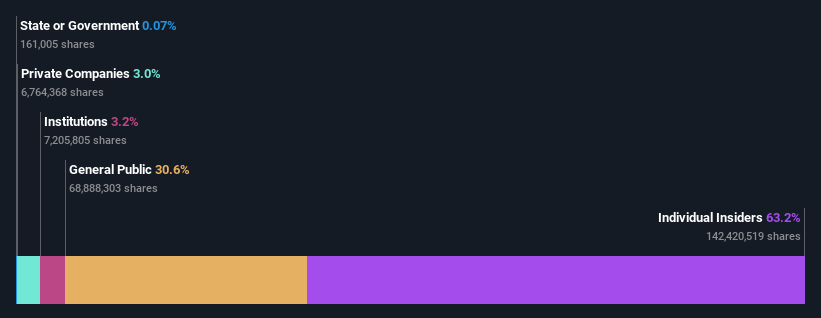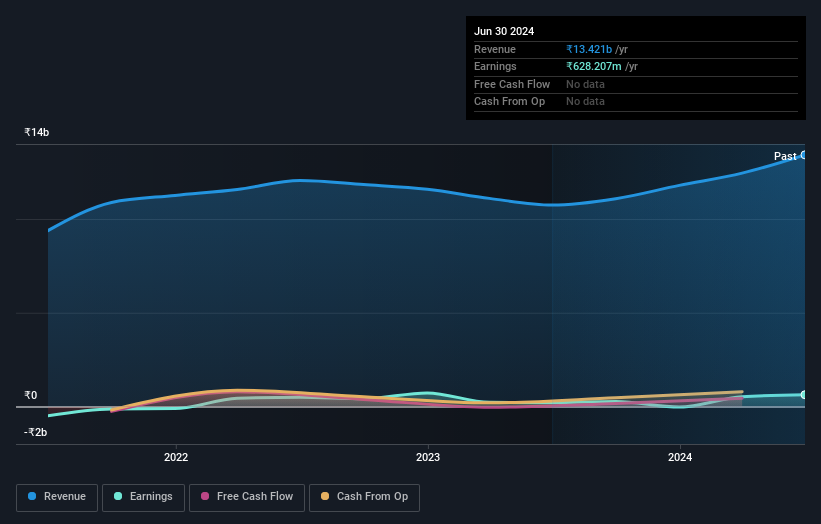- India
- /
- Construction
- /
- NSEI:BLKASHYAP
B.L. Kashyap and Sons Limited (NSE:BLKASHYAP) insiders still own 63% despite recent sales, but recent decline may have cost them
Key Insights
- B.L. Kashyap and Sons' significant insider ownership suggests inherent interests in company's expansion
- The top 3 shareholders own 62% of the company
- Insiders have been selling lately
To get a sense of who is truly in control of B.L. Kashyap and Sons Limited (NSE:BLKASHYAP), it is important to understand the ownership structure of the business. With 63% stake, individual insiders possess the maximum shares in the company. That is, the group stands to benefit the most if the stock rises (or lose the most if there is a downturn).
Despite selling some shares recently, insiders control a good portion of the company's stock. As market cap fell to ₹18b last week, they would have faced the highest losses than any other shareholder groups of the company.
In the chart below, we zoom in on the different ownership groups of B.L. Kashyap and Sons.
View our latest analysis for B.L. Kashyap and Sons

What Does The Institutional Ownership Tell Us About B.L. Kashyap and Sons?
Many institutions measure their performance against an index that approximates the local market. So they usually pay more attention to companies that are included in major indices.
Since institutions own only a small portion of B.L. Kashyap and Sons, many may not have spent much time considering the stock. But it's clear that some have; and they liked it enough to buy in. So if the company itself can improve over time, we may well see more institutional buyers in the future. When multiple institutional investors want to buy shares, we often see a rising share price. The past revenue trajectory (shown below) can be an indication of future growth, but there are no guarantees.

We note that hedge funds don't have a meaningful investment in B.L. Kashyap and Sons. Looking at our data, we can see that the largest shareholder is the CEO Vineet Kashyap with 22% of shares outstanding. In comparison, the second and third largest shareholders hold about 22% and 18% of the stock. Interestingly, the second and third-largest shareholders also happen to be the Co-Chief Executive Officer and Chairman of the Board, respectively. This once again signifies considerable insider ownership amongst the company's top shareholders.
After doing some more digging, we found that the top 3 shareholders collectively control more than half of the company's shares, implying that they have considerable power to influence the company's decisions.
While studying institutional ownership for a company can add value to your research, it is also a good practice to research analyst recommendations to get a deeper understand of a stock's expected performance. We're not picking up on any analyst coverage of the stock at the moment, so the company is unlikely to be widely held.
Insider Ownership Of B.L. Kashyap and Sons
While the precise definition of an insider can be subjective, almost everyone considers board members to be insiders. The company management answer to the board and the latter should represent the interests of shareholders. Notably, sometimes top-level managers are on the board themselves.
Most consider insider ownership a positive because it can indicate the board is well aligned with other shareholders. However, on some occasions too much power is concentrated within this group.
Our information suggests that insiders own more than half of B.L. Kashyap and Sons Limited. This gives them effective control of the company. Given it has a market cap of ₹18b, that means they have ₹11b worth of shares. Most would argue this is a positive, showing strong alignment with shareholders. You can click here to see if those insiders have been buying or selling.
General Public Ownership
The general public, who are usually individual investors, hold a 31% stake in B.L. Kashyap and Sons. While this group can't necessarily call the shots, it can certainly have a real influence on how the company is run.
Private Company Ownership
Our data indicates that Private Companies hold 3.0%, of the company's shares. It's hard to draw any conclusions from this fact alone, so its worth looking into who owns those private companies. Sometimes insiders or other related parties have an interest in shares in a public company through a separate private company.
Next Steps:
It's always worth thinking about the different groups who own shares in a company. But to understand B.L. Kashyap and Sons better, we need to consider many other factors. To that end, you should be aware of the 1 warning sign we've spotted with B.L. Kashyap and Sons .
Of course this may not be the best stock to buy. So take a peek at this free free list of interesting companies.
NB: Figures in this article are calculated using data from the last twelve months, which refer to the 12-month period ending on the last date of the month the financial statement is dated. This may not be consistent with full year annual report figures.
Valuation is complex, but we're here to simplify it.
Discover if B.L. Kashyap and Sons might be undervalued or overvalued with our detailed analysis, featuring fair value estimates, potential risks, dividends, insider trades, and its financial condition.
Access Free AnalysisHave feedback on this article? Concerned about the content? Get in touch with us directly. Alternatively, email editorial-team (at) simplywallst.com.
This article by Simply Wall St is general in nature. We provide commentary based on historical data and analyst forecasts only using an unbiased methodology and our articles are not intended to be financial advice. It does not constitute a recommendation to buy or sell any stock, and does not take account of your objectives, or your financial situation. We aim to bring you long-term focused analysis driven by fundamental data. Note that our analysis may not factor in the latest price-sensitive company announcements or qualitative material. Simply Wall St has no position in any stocks mentioned.
About NSEI:BLKASHYAP
B.L. Kashyap and Sons
Engages in the construction and infrastructure development activities in India.
Adequate balance sheet with low risk.
Similar Companies
Market Insights
Community Narratives




